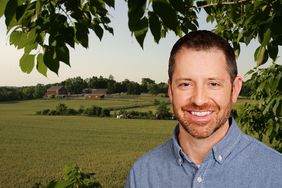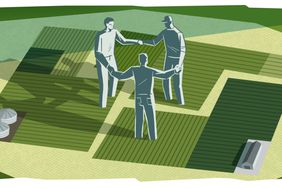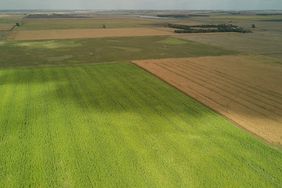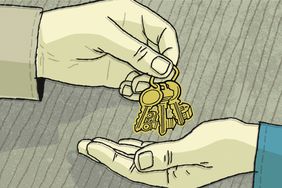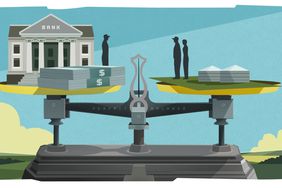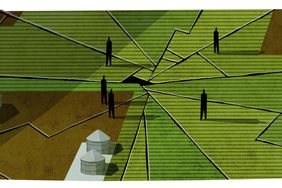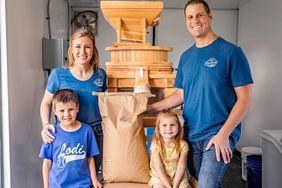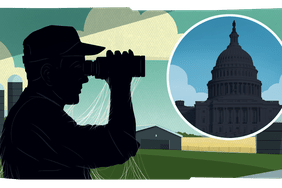:max_bytes(150000):strip_icc()/7018437_ErikPeterson-9550ae1a94c44d2cbf425dafd66a6ccf.jpg)
Ryan Borts
Benjamin Franklin famously said, “By failing to prepare, you are preparing to fail.”
Franklin is best known as a founding father of the United States and a brilliant scientist. He also helped form the first volunteer fire department in the colonies in 1736 and served as chief. As a farmer in his retirement years, Franklin studied drainage, crop rotation, and fertilization.
Kevin Peterson of Gilbert, Iowa, was also a farmer and a firefighter, and he, too, understood the importance of being prepared. He knew that without a continuation plan, his family farm likely would not survive if something happened to him, and that was not an option.
He was in his early 60s. He believed he had plenty of time to figure things out, but he couldn’t rest until a plan was in place. He read, researched, tore articles out of magazines, and found experts to help.
They created a strategy that would allow him to purchase the farmland from his mother; provide for his wife, Lynn; allow their son, Erik, to eventually take over the farm; and create an inheritance for their daughter, Lindsay Borst.
Within just a few years of that estate plan being finalized, Kevin died as the result of a motorcycle accident.
:max_bytes(150000):strip_icc()/FarmSchooliconredtassel1-884b03b504ba4a74bff7d30e3346b098.png)
An educational series for farmers who want to take their skills to the next level. Check out more Farm School content HERE.
Succession planning 101: Start a conversation and find your people
The Petersons’ farm continuation planning story began in 2014 when Kevin and Erik attended a workshop hosted by Mark McLaughlin at a farm show.
Erik had been in the Marine Corps for four years but was now farming with his dad and working alongside him as a member of the Ames, Iowa, Fire Department.
McLaughlin, an associate with Farm Financial Strategies and co-owner of Farm Estate GPS in Ankeny, Iowa, has been working with farm families on succession strategies for nearly two decades. He shares in the fifth-generation ownership of his family’s farm and is one of the authors of the “Can Their Problem Be Solved” column for Successful Farming magazine.
“My dad would call Mark with these pointed questions almost like he was trying to become a subject matter expert, which was how he did things,” Erik says. “He’d figure it out as far as he could go, then when he got to a stopping point he’d call somebody and probe him for knowledge.”
McLaughlin became the Petersons’ go-to expert for estate planning and farm succession. He came to the farm on many occasions and sat with the family around the kitchen table of Kevin and Lynn’s cozy home, going over all the possibilities and ways to manage them.
“He became like a member of the family,” Lynn says. “He and Kevin would laugh and laugh.”
Lynn places a business card holder on the table and fans out a handful of cards: the accountant, the tax preparer, the grain marketer, McLaughlin. “This is my Google,” she says. “These are my people.”
Succession planning 201: Make contingency plans
The initial concern was to protect the land from the top down. “Kevin’s mom was widowed and owned all the land. She was sharp and knew what she and her husband had wanted but didn’t know how to get there,” McLaughlin says. “Her overriding goals were to keep their 300 acres in one piece for Kevin and Erik to farm, and lock in a price that cash-flowed for them to own the ground.”
They eventually began to work on the terms for a contract sale, fully understanding that land prices rise and fall over time. “They always believed fixed numbers were better than variable,” McLaughlin says. “And Kevin’s mom wanted everything based on family value, not appraised value.”
Kevin was intentional on how he presented this idea to his brother and two sisters. “He wanted to make it as attractive of a deal for them as possible without breaking the bank doing it,” Erik says. “There was a lot of legwork and tender-footing that had to occur just to get it to the point where we could work out our own personal succession plan.”
Not all of Kevin’s siblings were on board at first, but Erik says,
“Grandma wanted it to roll to the next generation in one piece. If you keep splitting it and selling it, the one who benefits there is the bank.”
Ultimately, it was her decision. “And she would go toe to toe with anyone who had an issue with it,” Lynn says.
With help from their attorney and CPA, they set up a contract for Kevin to purchase the farmland from his mother over a 20-year period. Some of her gifting allowance was used to offset the cost, essentially advancing Kevin’s inheritance of one-fourth of the land to lower the purchase price.
“That makes Grandma the bank and gives her the interest, which then offsets where you can set your price per acre and it just makes it an easier cash flow,” Erik says.
Kevin and Lynn then went to work on their own estate to maintain the contract and establish rental and purchase options between Erik and Lindsay. They also set up $1 million term life insurance policies on each other so the survivor could pay off debt. The secondary beneficiary was Erik, rather than both kids, to provide additional planning flexibility for farm continuation.
Succession planning 301: Final farm distribution strategies
"The Petersons' initial planning decisions created the framework to achieve their final distribution goals,” McLaughlin says.
After Kevin’s death, Lynn could have kept the $1 million death benefit. Instead, she disclaimed it to Erik. That gave him cash to buy Kevin’s machinery from her. She still ended up with the cash, but this pushed the machinery equity to Erik.
“Their CPA helped get a full stepped-up basis on Kevin’s machinery, so there was no tax on the sale. The life insurance was tax-free, and Erik got to re-depreciate the machinery all over again,” McLaughlin says. “Lynn ended up with land and cash, which simplified her financial life.”
Lynn continues to pay off the farmland, and it should be free and clear within the next few years. “That’s my goal,” she says.
Kevin’s estate avoided probate because everything was owned joint tenancy. “We worked with Lynn’s attorney again to change her will to a revocable trust to avoid probate upon her death,” McLaughlin says. “Her trust provides rental options and ultimately distributes the land and remaining debt to Erik. He knows he’ll fully own the Peterson farm someday.”
Erik is receiving more inheritance than his sister because has invested so much sweat equity into the farm, and because that’s the only way to pass it on in one piece. “Fair is what we’re going for here, not equal,” Lynn says. “They’re not the same.”
Lynn’s term life insurance was converted to permanent, so the death benefit and premium would stay fixed for life. They changed the beneficiary on this policy and a separate $250,000 policy to Lindsay. She’ll also inherit other nonfarm assets. “Lindsay knows she can fully pursue her own interests with her inheritance,” McLaughlin says.
Lindsay communicated with the others throughout the entire process, and she was on board with the decisions. She had been living in Alexandria, Virginia, work-ing for the Smithsonian Institution, and raising a son. Her husband had died a few years earlier. When Kevin died, she moved back to Gilbert and began working for the school.
“Lindsay’s been great. She always wanted Erik to farm,” McLaughlin says. “He wanted to farm but didn’t know if there’d be a farm to come back to. His family deserves all the credit for where they are today. They took proactive steps to understand the issues and learn the options, and they kept moving forward to accomplish their goals. They’re salt-of-the-earth people who truly care about their family and farm.”
Succession planning course review: Looking back
While Kevin’s death was unexpected, there was a plan in place to deal with the financial ramifications. “All that planning hit home really fast,” McLaughlin says. “It was only a few years before their plan became their reality.”
“Even before Kevin died, it was a comfort to know that there were going to be assets that we were going to be able to manage. That doesn’t mean that we can be wasteful. We still have to be cautious,” Lynn says. “Still, it behooves us to be ready for the end game, you know? But it’s good not to have to lose sleep over this, because it would be really gut-wrenching if we did.”
They know that not every family is fortunate enough to have this kind of succession plan in place when the patriarch dies. Lynn says, “We don’t take it for granted at all.”
Erik's advice to other farm families is to pick up the phone and make an appointment with a professional to make an estate plan. “Make time and put it in your calendar. Make sure you just get it squared away, because if you don’t, it’s a hell of a lot tougher situation than having a pot of money show up,” he says. “You know, nobody gets out of here alive.”
While the planning and preparation have certainly helped, of course it is still devastating to lose a husband and father. “You don’t ever get over it. No. You just learn to carry it,” Lynn says.
Five years have passed since the accident and Kevin’s death. “You and I have had some really meaningful conversations about the significance of five years,” Erik says to his mother as they look at a photos of Kevin. “It has been the fastest five years, and I don’t foresee it slowing down.”
“I think we’ve found a balance,” Lynn says. They’ve both learned to take mental health days when needed, and they’re still leaning on their stable of experts.
“At Kevin’s funeral, everyone was in line after-wards giving us a hug or a handshake, and when Mark came up, I just about cried,” Lynn says. “What he did for our family could not be replicated.”
Erik agrees. “I thanked him and he said, ‘Don’t thank me; thank your dad because he was the one that started this.’”
Check out more Farm School content HERE.
This educational editorial series is sponsored by:

:max_bytes(150000):strip_icc()/LisaFoustPrater-5d5284849acc417c8678324f9c660161.jpg)







